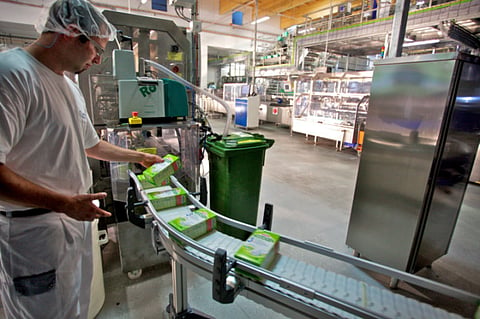Nestle sees food price pressure easing
Confirms outlook for organic growth of 5-6 per cent

Zurich: Nestle expects pressure from the high prices of basic foodstuffs to ease in the second half of the year, helping it meet its sales growth target in tough markets, after first-half results beat forecasts.
The world’s biggest food group said underlying sales rose 6.6 per cent as volume growth ticked up, which analysts said was unique in the sector.
Growth was driven by strong demand from emerging markets and price increases, as the company managed to pass on the soaring cost of its raw materials to consumers.
Net profit rose 8.9 per cent to 5.1 billion Swiss francs (Dh19.19 billion, $5.25 billion) on sales of 44.1 billion francs, up 7.5 per cent year-on-year, with 3.7 percentage points of the rise in underlying sales coming from price increases.
Analysts surveyed by Reuters had forecast on average a net profit of 4.9 billion francs and sales of 43.8 billion francs.
Nespresso, Nestle’s fastest-growing big brand, posted “high double-digit growth,” although analysts noted that contrasted with first-quarter growth of “around 20 per cent”.
Nestle also announced that changes to accounting of its pension liabilities would hit net profit by about 360 million francs from 2013 and increase financing costs by 250 million, although it would have no impact on underlying performance.
Nestle also reported solid performance in Europe, despite its weak economy, as the company sold more affordable goods like its Nescafe 3-in-1 soluble coffee, KitKat chocolate bars and new peelable banana ice cream.
Analysts had on average forecast 6.3 per cent sales growth.
“A very solid set of numbers for what is a class act in the space,” said Jon Cox, analyst at Kepler Capital Markets.
The Vevey-based company, which is a big consumer of raw materials such as coffee, cocoa and milk, said input cost pressure resulted in an increase of 50 basis points in the cost of goods sold.
World food prices surged in July after falling in the previous three months and could rise further, the United Nations food agency said on Thursday. The agency bases its price index on a food basket including cereals, dairy and sugar.
Nestle said it expected commodity price pressures to ease in the second half, helping it meet its long-term target for underlying sales growth of 5-6 per cent this year despite the tough business environment, especially in developed markets.
The worst US drought in over half a century has pushed up grain prices sharply, but cereals only make up a relatively small part of Nestle’s raw material costs and the company is well hedged against other commodity prices.
Nestle is maintaining its outlook for input prices to rise in the low to mid-single digits for the year, Chief Financial Officer Wan Ling Martello told analysts, without giving details.
While cocoa prices are surging, coffee and sugar prices are down on expectations of a good harvests in top producer Brazil and milk prices have also been falling.
First-half sales grew 12.9 per cent in emerging markets, compared with just 2.6 per cent in developed markets, with volume growth in Europe practically flat although the company still saw some expansion in the continent’s troubled southern nations.
Strong emerging markets also helped Unilever avoid the recent profit warnings by its French and US peers Danone and Procter & Gamble, although it did warn of tougher times ahead due to difficult economies and volatile input costs.
EUROPE HOLDING UP
Nestle shares rose 2.5 per cent to a new all-time high of 61.15 francs by 0946 GMT, compared with a 0.7 per cent increase for the European food and beverage index. Analysts contrasted Nestle’s performance in Europe, where it saw 2.4 per cent organic growth, with Unilever’s fall in sales in the region of 2.2 per cent in the second quarter.



